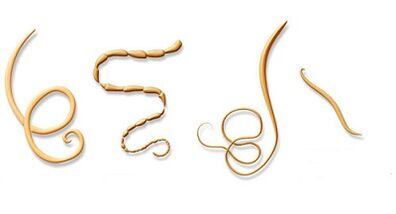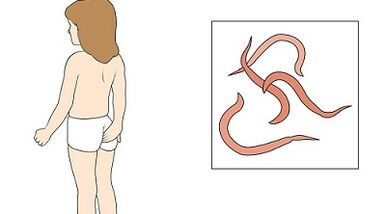In order to identify symptoms in good time and successfully treat parasites in the human body, patients must consult a doctor at the first signs of illness.
There are currently about 300 types of microorganisms that can successfully exist in the internal organs of humans.
The main route of parasite infestation is via dirty hands, objects and food.
Invasive diseases are treated with drugs and traditional medicine. In severe cases, surgery may be required.
The main groups of parasites in the human body
After entering the internal environment, parasites in the human body feed on nutrients or organ tissues that are supplied with food.
In the future, the lack of micro and macro elements, minerals and vitamins causes various disorders in the work of all systems and organs in patients.
Main routes of infection:
- mouth feces- Parasites get into the human body after consumption of contaminated food and water.
- Contact household- larvae and eggs of worms invade a person due to unwashed hands after contact with infected objects or animals;
- through the skin- The larvae of parasites invade the skin or through the bites of insect vectors.

There are different types of worms:
- round;
- tape;
- subcutaneous;
- leeches;
- fabric.
The roundworm group is the largest and most widespread. It includes roundworms, pinworms, whipworms, toxocaras, and worms.
Parasites get into the human body through dirty hands or mouth after eating contaminated food: fruits, vegetables, meat that has not been heat-treated. Roundworms settle in the gastrointestinal tract of patients.
Tapeworms include beef and pork tapeworms, broadband worms, and echinococcus. The worms in this group are large. For example, a tapeworm can reach a length of 25 m.
Tapeworms can feed on any tissue or fluid in the human body. The sources of these parasites are improperly cooked meat and fish.
The next type are subcutaneous worms. They are most often found in exotic countries: the African continent, India, Iraq and so on.
signs of the presence of parasites in the human body - formations that move under the skin, causing severe pain.
Infection of patients with infection occurs through bites of flies, mosquitoes or bed bugs, ie blood-sucking insects.
Flukes (Trematodes) - Liver fluke (Fluke or Fasciola), Schistosom, Fascilopsis.
Parasites live in the human liver, pancreas, biliary tract and intestines.
Patients are infected with uncooked water, milk, unpasteurized cheese, underprocessed meat and fish.
Tissue parasites in humans include trypanosomes, fins, sarcosporidia and microsporidia. Helminths of this group settle in the human lungs, spinal cord and brain, as well as in muscle tissue.
The carriers of parasites are wild animals and domestic animals: horses, pigs, chickens and others. Tissue worms are transmitted to humans through poorly cooked meat.
Symptoms of parasitic pathologies
The symptoms and treatments of parasites in the human body vary depending on the type of worms.
Parasites have adapted perfectly to human organs and made them their home.
People may not even notice the presence of worms, but parasitic infestation increases the manifestation of chronic pathologies in adults and children. Often it is precisely these signs that indicate the penetration of parasites into the human body.
Worms and other parasitic organisms (protozoa or insects) feed on the human body and multiply there.
They infect the eyes, skin, hair and internal organs of patients. And only constant tiredness, sleepiness or obesity indicate that the patient is a parasite carrier.

A sick person has the following symptoms of a parasite infection:
- anemia unresponsive to treatment;
- weakness;
- unreasonable hunger;
- a sharp change in body weight in one direction or another;
- headache of unspecified etiology;
- constipation followed by diarrhea;
- signs of irritable bowel syndrome;
- feeling of heaviness in the liver area;
- joint and muscle pain;
- skin manifestations (rash, neurodermatitis, etc. );
- decreased immunity;
- depression and neurosis;
- insomnia.
During the examination of the patient, the doctor visually examines his skin.
Signs of the presence of parasites in the human body include rashes, acne, pallor, sweat, early wrinkles, cracks, peeling, and excessively brittle nails. Often times, these symptoms suggest that parasites are present in the patient's GI tract.
If a child is infected with pinworms, the signs of parasites in the body are the following - unbearable itching in the anal area.
The patient has a lack of growth, underdeveloped auricles, shortened fingers and falling hair, since parasites in children ingest all substances important for development.
Due to the presence of worms in the human stomach and other digestive organs, the mucous membrane becomes inflamed and an abundant white coating forms on the tongue. Such patients need to adhere to the nutrition table.
At the end of the examination, the doctor analyzes the general condition of the patient's entire body in order to identify the manifestation of pathogenic factors.
For example, parasites in the body of women manifest their presence in the following ways: patients suffer from general malaise, aching pain in the lower back, menstrual disorders, and suffer from inflammation of the bladder and kidneys. Men can develop prostatitis and impotence.
Drug treatment
Parasites settle in a person's lungs, intestines, muscles and other internal organs. The symptoms of the disease in children are similar to those in adult patients.
In order to treat parasites in a person as effectively as possible, the doctor must collect a full medical history, including a description of symptoms and a collection of tests. During treatment, the patient is assigned a special diet.
Patients undergo several tests before they are prescribed anthelmintics:
- Analysis of feces for worm eggs;
- histological coprogram;
- serological blood test;
- hemoscanning.
Several medicines are used to kill worms when treating parasites in children and adults.
Every anthelmintic is aimed at destroying a specific type of worm in the human body.
Specific antiparasitic drugs are only prescribed to patients in situations where the intended benefit outweighs the potential harm of treatment.
Patients should not choose antihelminthics and self-medication without consulting a doctor, as drugs of this group are very toxic to humans. In addition, when treating parasites, patients are prescribed a diet.
Traditional methods of combating parasites
Some folk remedies have an anthelmintic effect, so the destruction of parasites at home is carried out by resorting to their help.
Before starting treatment, patients should consult a doctor, since a diet with infusions of certain plants can be dangerous in some chronic diseases of the human body.
Among the common means of eliminating parasites in patients' bodies, the most effective are:
- Garlic tincturefrom pinworms in the human body for making an enema - to prepare it you need to knead 10 cloves of garlic, pour a glass of boiled water and let it rest for several hours;
- Pumpkin seedsis a simple way to kill tapeworms in patients' intestines. For treatment, eat 2 tablespoons of peeled seeds on an empty stomach;
- Onion infusion- is used against Ascaris and pinworms in the human body. Half a can of finely chopped onions should be poured with a forty percent aqueous solution of ethyl alcohol and kept in a dark place for a week. Then filter and take 1 tbsp. Spoon half an hour before meals. Only adult patients and non-alcoholic patients can be treated with IV fluids.
- Walnut cook- this remedy is used for roundworms in the human body. Unripe fruits are crushed, poured with boiling water and infused overnight. Then drink them in servings per day.
According to the recommendations of traditional medicine, you can remove worms from the human body with the help of burning spicy foods.
However, they should be used in moderation against parasites in patients, as they have an irritating effect on the mucous membranes.
Pepper, ginger, mustard, garlic, onion, horseradish and cloves have a pronounced burning taste that is unacceptable for helminths in the human intestine. Among the medicinal herbs against worms, wormwood is often used.
Pharmacies offer many drugs to kill parasites in the human body, but many of them have side effects and are harmful to health.
Not all drugs for eliminating helminths in the human body are approved for pregnant women and children.
Preventive measures to prevent parasite infestation
Precautions are the most effective way to protect yourself from parasites in the human body. From childhood, everyone is taught to wash their hands after working in a flower bed, toilet or walking on the street, since earth and dust contain eggs from worms.
Before people travel to exotic species in equatorial latitudes, they should receive all the necessary vaccinations to avoid contracting helminths.
Following simple prevention rules, everyone can successfully protect themselves from a possible infection with parasites.
Rules for personal hygiene:
- regular thorough washing of hands and the space under the nails - this must be done after working in sand, earth, after using the toilet, communicating with animals and before eating;
- Nails should preferably be cut short, as parasite eggs can collect under the nails.
- Vegetables, berries, fruits and other fruits and herbs should be washed under running tap water for a long time. This ensures that all of the worms' eggs are washed off their surface;
- Meat and fish should be completely heat treated. Meat with blood can be dangerous to human health as it can contain eggs and larvae of parasites.
- You are not allowed to drink uncooked water from wells and springs as it can contain parasites.
- Water and milk should only be drunk boiled to kill worms.
- pasteurized lactic acid products should be consumed. Raw cheese can contain eggs and parasite larvae.
Experts recommend that you be checked regularly for the presence of parasites in the human body.
Do not take any antihelminthics as prophylactic parasites in the internal organs, as they have a toxic effect.
The self-medication of parasites in the human body in any form can pose a health risk. If there are pets in the family, they should be dewormed regularly.
Preventing parasites in the human body can help avoid many dangerous worms.
Compliance with the basic rules of personal hygiene can protect all family members, since helminthiasis in the human body is one of the most unpleasant parasitic diseases that disrupt the functioning of all systems and internal organs.
























